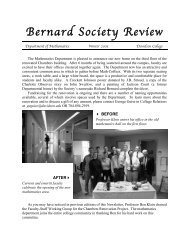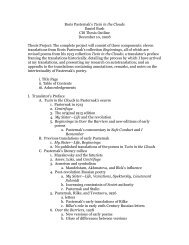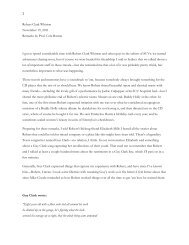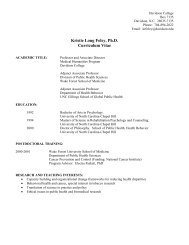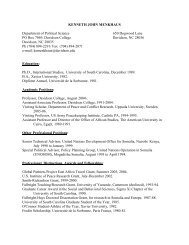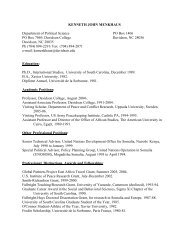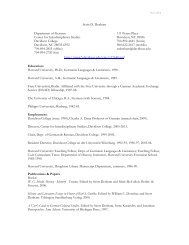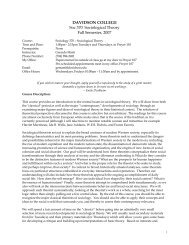Sociology of Hollywood - Gerardo Marti - Davidson College - 2011
Sociology of Hollywood - Gerardo Marti - Davidson College - 2011
Sociology of Hollywood - Gerardo Marti - Davidson College - 2011
You also want an ePaper? Increase the reach of your titles
YUMPU automatically turns print PDFs into web optimized ePapers that Google loves.
“Film, after all, is more than mere celluloid. It is socially constructed within a threecornered<br />
association between film makers, film spectators, and the film texts themselves,<br />
and at every point in that nexus <strong>of</strong> relationships we encounter negotiation and interaction<br />
involving active social beings and institutionalized social practices. <strong>Sociology</strong> is the<br />
intellectual resource best suited to probing that particular complex <strong>of</strong> social activity.”<br />
Please note: The sociology <strong>of</strong> <strong>Hollywood</strong> is less concerned with the critical study <strong>of</strong> the products <strong>of</strong> the<br />
institution (movies) than with the analysis <strong>of</strong> the cultural/commercial institution that comprises<br />
“<strong>Hollywood</strong>.”<br />
Also note that this course is writing and speaking intensive. Critical reading <strong>of</strong> texts, cogent writings,<br />
articulate oral presentations, and full participation in dialogue are mandatory. Class assignments will<br />
measure your ability to grasp and apply sociological perspective from readings and from information<br />
emerging from class discussions. A critical book review and a thematic research paper provide<br />
opportunities to pursue interests in greater depth. Full attendance is not only encouraged but expected.<br />
Course goals for this course include:<br />
• Apply the aims and objectives <strong>of</strong> sociological analysis,<br />
• Know outstanding contemporary demographic characteristics <strong>of</strong> the <strong>Hollywood</strong> industry,<br />
• Analytically construct reciprocal connections between broad social changes in the twentieth<br />
century with changes in film industry,<br />
• Demonstrate understanding <strong>of</strong> the changing organizational dynamics <strong>of</strong> film production and<br />
distribution,<br />
• Demonstrate understanding <strong>of</strong> labor relations and significant occupational issues in the film<br />
industry over its history,<br />
• Describe the political and/or social philosophy <strong>of</strong> various economic, civic, political, religious<br />
leaders and movements shaping the development <strong>of</strong> the film industry in America,<br />
• Analyze and provide examples <strong>of</strong> the significance <strong>of</strong> race and ethnicity in film industry both<br />
historical and contemporary,<br />
• Analyze and provide examples <strong>of</strong> the significance <strong>of</strong> religion in film industry both historical<br />
and contemporary,<br />
• Analyze the significance <strong>of</strong> celebrity in contemporary culture,<br />
• Clearly discuss political economy theory and other current theoretical perspectives applied by<br />
scholars understanding the film industry,<br />
• Demonstrate understanding <strong>of</strong> the dynamics <strong>of</strong> globalization through the lens <strong>of</strong> <strong>Hollywood</strong>’s<br />
worldwide presence and the affinities between <strong>Hollywood</strong> and fundamental changes in<br />
contemporary society, and<br />
• Develop analytical and critical thinking abilities in both written and oral forms in exploring<br />
ideas, cultural artifacts, and current events as they relate to the motion picture industry.<br />
Required Books & Readings for All Students:<br />
• Richard Maltby. 2003. <strong>Hollywood</strong> Cinema. Second Edition. Blackwell.<br />
Dr. <strong>Marti</strong>, Soc 380 Seminar<br />
2




